Mental Health Promotion by Aboriginal Health Workers in Australia
VerifiedAdded on 2022/11/09
|9
|2508
|181
Essay
AI Summary
This essay examines the crucial role of Aboriginal Health Workers (AHWs) in promoting mental health within Aboriginal and Torres Strait Islander communities in Australia. It highlights the disparities faced by indigenous populations, including social determinants, discrimination, and cultural disconnection, which contribute to mental health challenges like depression. The essay explores the AHWs' role in primary health care, emphasizing their community-based approach and intermediary function between the community and healthcare systems. It then applies the Ottawa Charter for Health Promotion's five strategies—developing personal skills, building healthy public policy, creating supportive environments, strengthening community action, and re-orienting health services—to propose actionable plans for AHWs to address mental health issues. These plans include mental health awareness programs, advocating for economic support, fostering inclusive environments, encouraging community participation, and integrating mental health services while respecting cultural sensitivity. The essay underscores the importance of AHWs in bridging gaps and improving mental health outcomes for indigenous Australians.
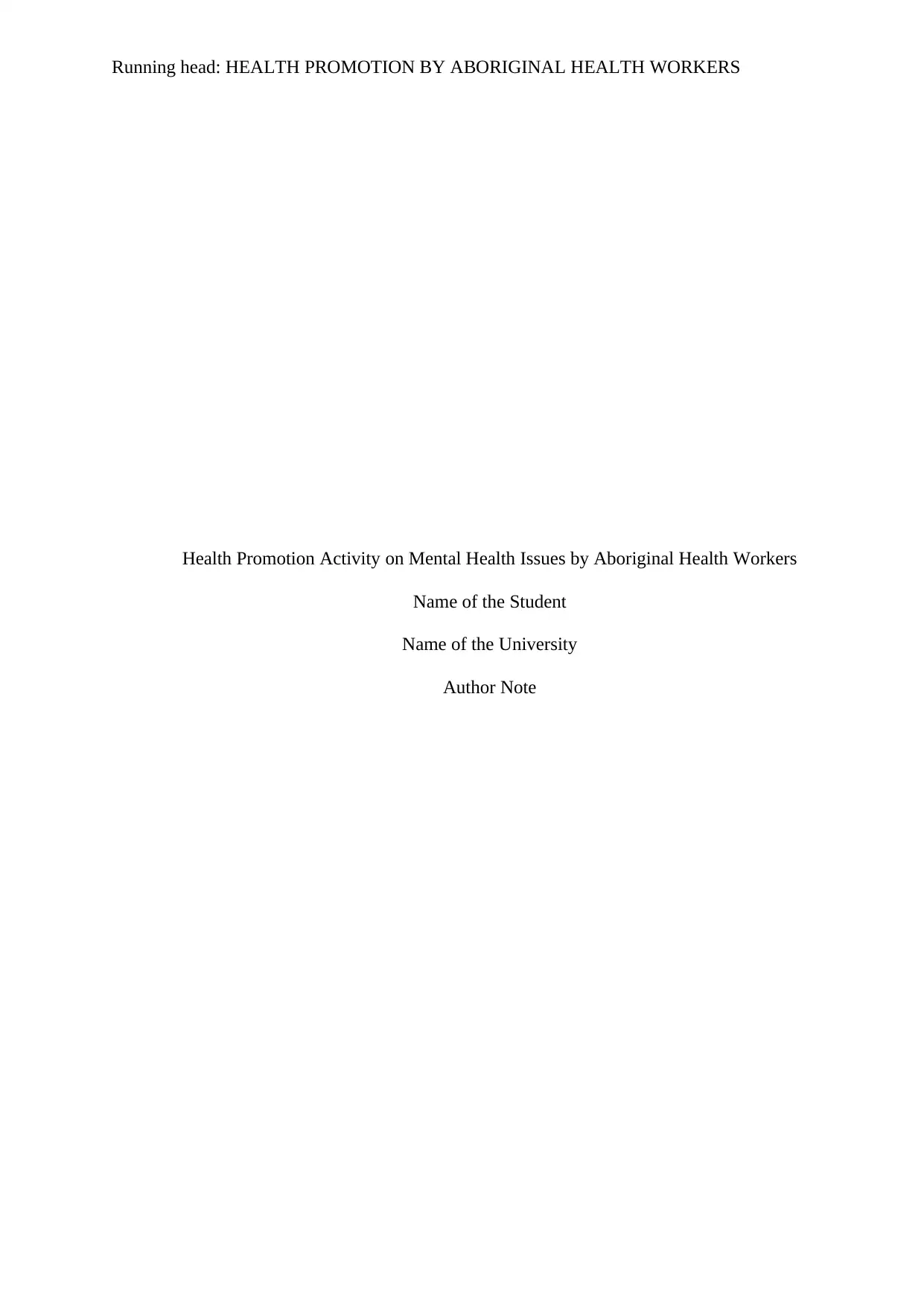
Running head: HEALTH PROMOTION BY ABORIGINAL HEALTH WORKERS
Health Promotion Activity on Mental Health Issues by Aboriginal Health Workers
Name of the Student
Name of the University
Author Note
Health Promotion Activity on Mental Health Issues by Aboriginal Health Workers
Name of the Student
Name of the University
Author Note
Paraphrase This Document
Need a fresh take? Get an instant paraphrase of this document with our AI Paraphraser
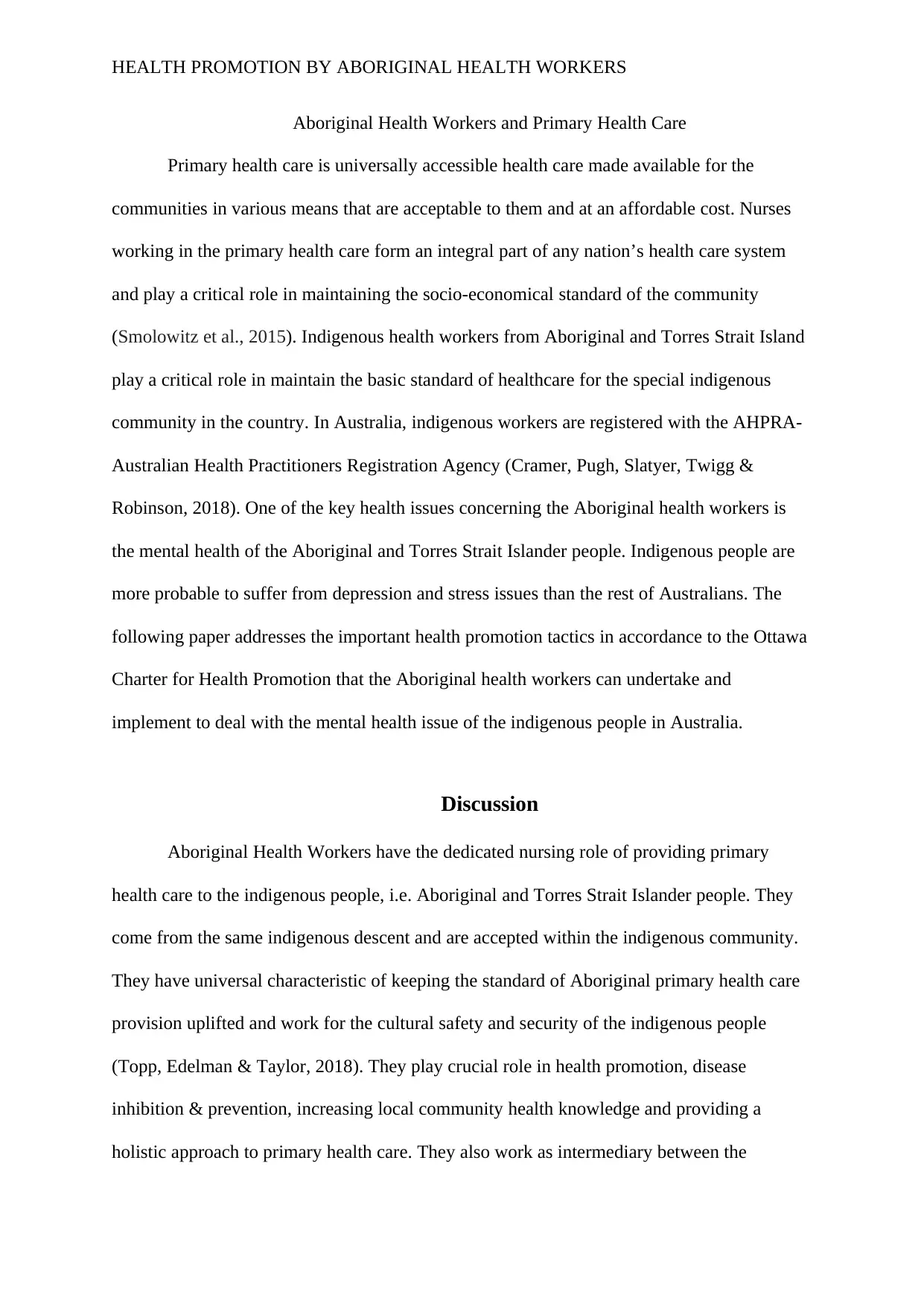
HEALTH PROMOTION BY ABORIGINAL HEALTH WORKERS
Aboriginal Health Workers and Primary Health Care
Primary health care is universally accessible health care made available for the
communities in various means that are acceptable to them and at an affordable cost. Nurses
working in the primary health care form an integral part of any nation’s health care system
and play a critical role in maintaining the socio-economical standard of the community
(Smolowitz et al., 2015). Indigenous health workers from Aboriginal and Torres Strait Island
play a critical role in maintain the basic standard of healthcare for the special indigenous
community in the country. In Australia, indigenous workers are registered with the AHPRA-
Australian Health Practitioners Registration Agency (Cramer, Pugh, Slatyer, Twigg &
Robinson, 2018). One of the key health issues concerning the Aboriginal health workers is
the mental health of the Aboriginal and Torres Strait Islander people. Indigenous people are
more probable to suffer from depression and stress issues than the rest of Australians. The
following paper addresses the important health promotion tactics in accordance to the Ottawa
Charter for Health Promotion that the Aboriginal health workers can undertake and
implement to deal with the mental health issue of the indigenous people in Australia.
Discussion
Aboriginal Health Workers have the dedicated nursing role of providing primary
health care to the indigenous people, i.e. Aboriginal and Torres Strait Islander people. They
come from the same indigenous descent and are accepted within the indigenous community.
They have universal characteristic of keeping the standard of Aboriginal primary health care
provision uplifted and work for the cultural safety and security of the indigenous people
(Topp, Edelman & Taylor, 2018). They play crucial role in health promotion, disease
inhibition & prevention, increasing local community health knowledge and providing a
holistic approach to primary health care. They also work as intermediary between the
Aboriginal Health Workers and Primary Health Care
Primary health care is universally accessible health care made available for the
communities in various means that are acceptable to them and at an affordable cost. Nurses
working in the primary health care form an integral part of any nation’s health care system
and play a critical role in maintaining the socio-economical standard of the community
(Smolowitz et al., 2015). Indigenous health workers from Aboriginal and Torres Strait Island
play a critical role in maintain the basic standard of healthcare for the special indigenous
community in the country. In Australia, indigenous workers are registered with the AHPRA-
Australian Health Practitioners Registration Agency (Cramer, Pugh, Slatyer, Twigg &
Robinson, 2018). One of the key health issues concerning the Aboriginal health workers is
the mental health of the Aboriginal and Torres Strait Islander people. Indigenous people are
more probable to suffer from depression and stress issues than the rest of Australians. The
following paper addresses the important health promotion tactics in accordance to the Ottawa
Charter for Health Promotion that the Aboriginal health workers can undertake and
implement to deal with the mental health issue of the indigenous people in Australia.
Discussion
Aboriginal Health Workers have the dedicated nursing role of providing primary
health care to the indigenous people, i.e. Aboriginal and Torres Strait Islander people. They
come from the same indigenous descent and are accepted within the indigenous community.
They have universal characteristic of keeping the standard of Aboriginal primary health care
provision uplifted and work for the cultural safety and security of the indigenous people
(Topp, Edelman & Taylor, 2018). They play crucial role in health promotion, disease
inhibition & prevention, increasing local community health knowledge and providing a
holistic approach to primary health care. They also work as intermediary between the
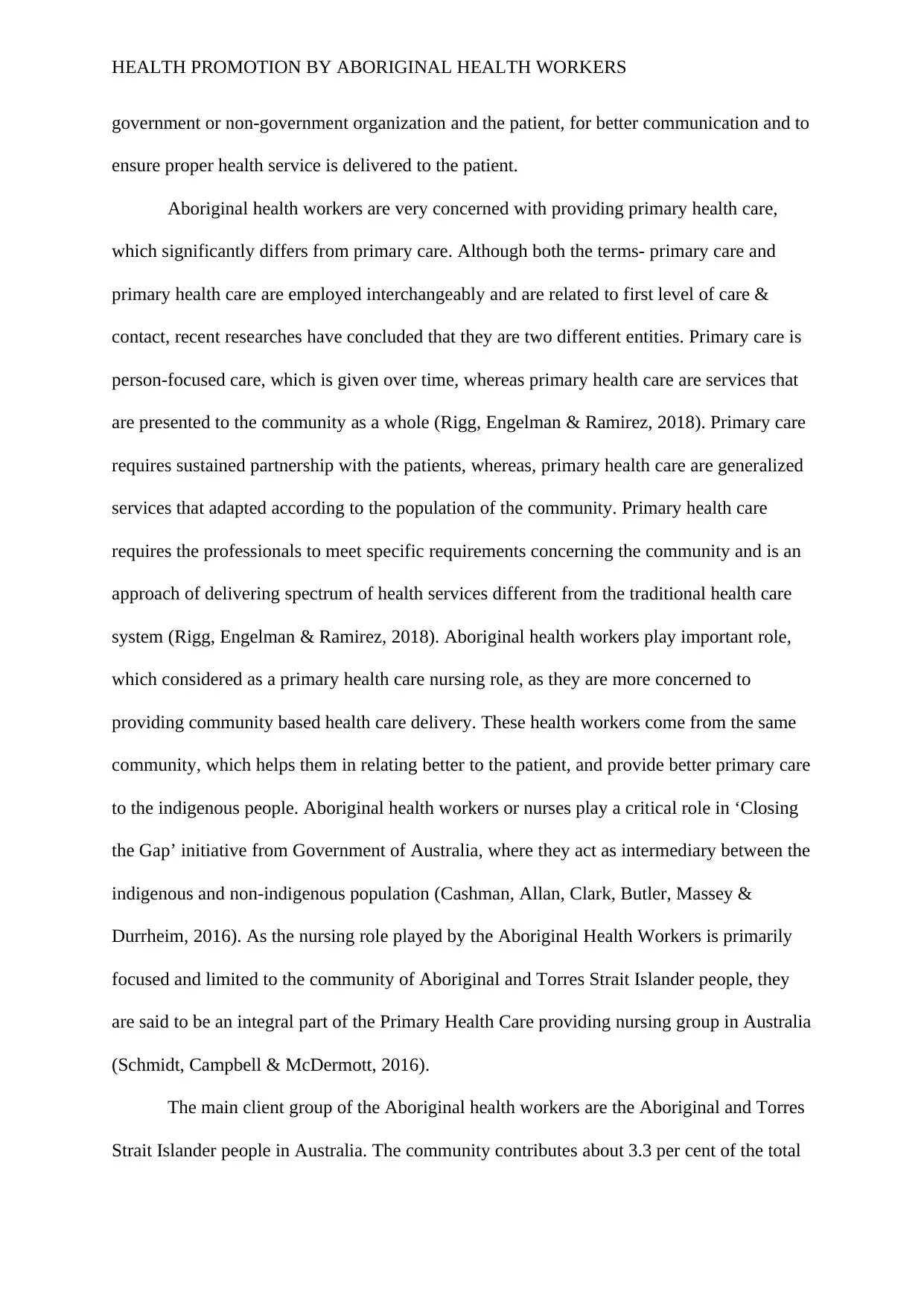
HEALTH PROMOTION BY ABORIGINAL HEALTH WORKERS
government or non-government organization and the patient, for better communication and to
ensure proper health service is delivered to the patient.
Aboriginal health workers are very concerned with providing primary health care,
which significantly differs from primary care. Although both the terms- primary care and
primary health care are employed interchangeably and are related to first level of care &
contact, recent researches have concluded that they are two different entities. Primary care is
person-focused care, which is given over time, whereas primary health care are services that
are presented to the community as a whole (Rigg, Engelman & Ramirez, 2018). Primary care
requires sustained partnership with the patients, whereas, primary health care are generalized
services that adapted according to the population of the community. Primary health care
requires the professionals to meet specific requirements concerning the community and is an
approach of delivering spectrum of health services different from the traditional health care
system (Rigg, Engelman & Ramirez, 2018). Aboriginal health workers play important role,
which considered as a primary health care nursing role, as they are more concerned to
providing community based health care delivery. These health workers come from the same
community, which helps them in relating better to the patient, and provide better primary care
to the indigenous people. Aboriginal health workers or nurses play a critical role in ‘Closing
the Gap’ initiative from Government of Australia, where they act as intermediary between the
indigenous and non-indigenous population (Cashman, Allan, Clark, Butler, Massey &
Durrheim, 2016). As the nursing role played by the Aboriginal Health Workers is primarily
focused and limited to the community of Aboriginal and Torres Strait Islander people, they
are said to be an integral part of the Primary Health Care providing nursing group in Australia
(Schmidt, Campbell & McDermott, 2016).
The main client group of the Aboriginal health workers are the Aboriginal and Torres
Strait Islander people in Australia. The community contributes about 3.3 per cent of the total
government or non-government organization and the patient, for better communication and to
ensure proper health service is delivered to the patient.
Aboriginal health workers are very concerned with providing primary health care,
which significantly differs from primary care. Although both the terms- primary care and
primary health care are employed interchangeably and are related to first level of care &
contact, recent researches have concluded that they are two different entities. Primary care is
person-focused care, which is given over time, whereas primary health care are services that
are presented to the community as a whole (Rigg, Engelman & Ramirez, 2018). Primary care
requires sustained partnership with the patients, whereas, primary health care are generalized
services that adapted according to the population of the community. Primary health care
requires the professionals to meet specific requirements concerning the community and is an
approach of delivering spectrum of health services different from the traditional health care
system (Rigg, Engelman & Ramirez, 2018). Aboriginal health workers play important role,
which considered as a primary health care nursing role, as they are more concerned to
providing community based health care delivery. These health workers come from the same
community, which helps them in relating better to the patient, and provide better primary care
to the indigenous people. Aboriginal health workers or nurses play a critical role in ‘Closing
the Gap’ initiative from Government of Australia, where they act as intermediary between the
indigenous and non-indigenous population (Cashman, Allan, Clark, Butler, Massey &
Durrheim, 2016). As the nursing role played by the Aboriginal Health Workers is primarily
focused and limited to the community of Aboriginal and Torres Strait Islander people, they
are said to be an integral part of the Primary Health Care providing nursing group in Australia
(Schmidt, Campbell & McDermott, 2016).
The main client group of the Aboriginal health workers are the Aboriginal and Torres
Strait Islander people in Australia. The community contributes about 3.3 per cent of the total
⊘ This is a preview!⊘
Do you want full access?
Subscribe today to unlock all pages.

Trusted by 1+ million students worldwide
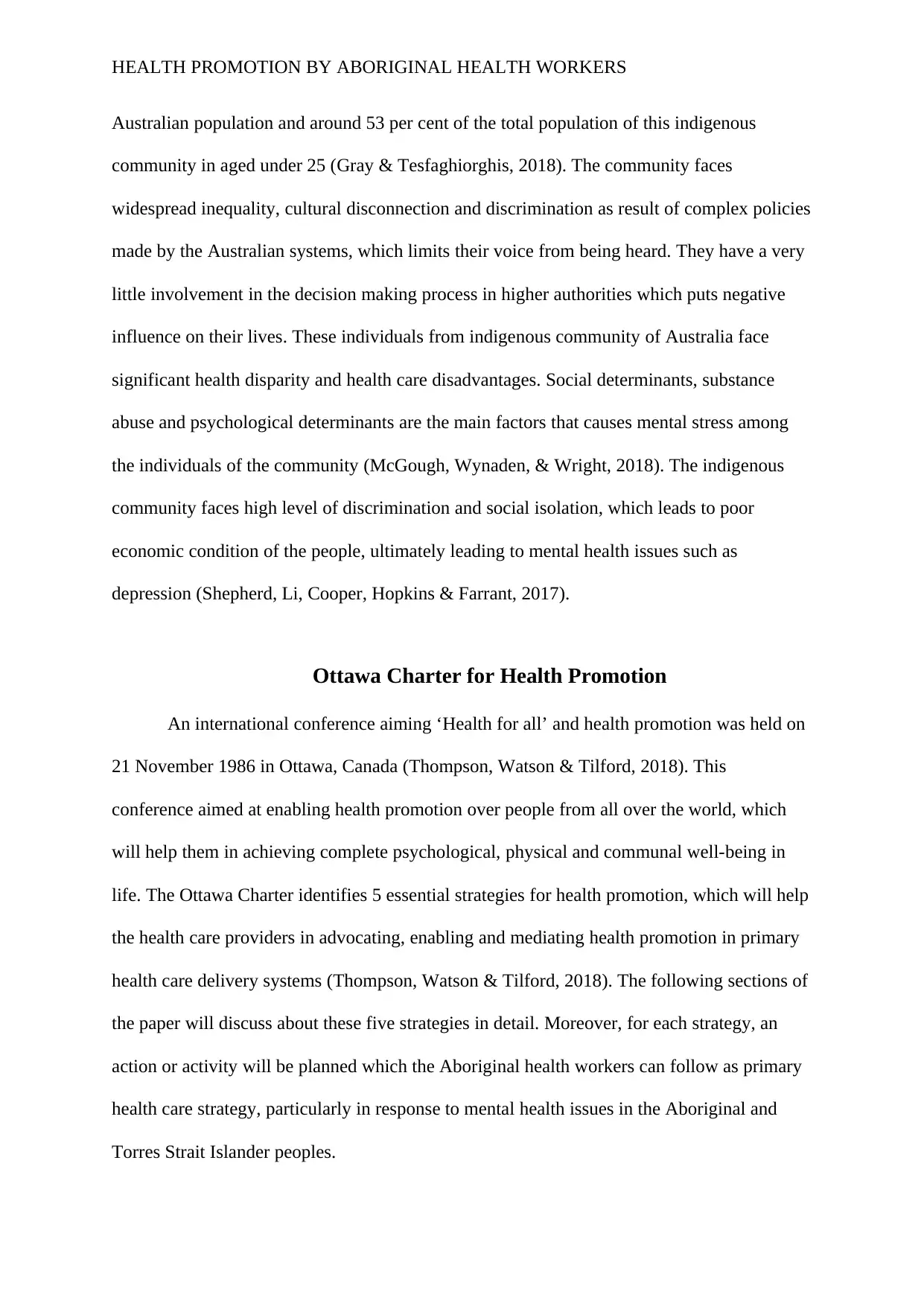
HEALTH PROMOTION BY ABORIGINAL HEALTH WORKERS
Australian population and around 53 per cent of the total population of this indigenous
community in aged under 25 (Gray & Tesfaghiorghis, 2018). The community faces
widespread inequality, cultural disconnection and discrimination as result of complex policies
made by the Australian systems, which limits their voice from being heard. They have a very
little involvement in the decision making process in higher authorities which puts negative
influence on their lives. These individuals from indigenous community of Australia face
significant health disparity and health care disadvantages. Social determinants, substance
abuse and psychological determinants are the main factors that causes mental stress among
the individuals of the community (McGough, Wynaden, & Wright, 2018). The indigenous
community faces high level of discrimination and social isolation, which leads to poor
economic condition of the people, ultimately leading to mental health issues such as
depression (Shepherd, Li, Cooper, Hopkins & Farrant, 2017).
Ottawa Charter for Health Promotion
An international conference aiming ‘Health for all’ and health promotion was held on
21 November 1986 in Ottawa, Canada (Thompson, Watson & Tilford, 2018). This
conference aimed at enabling health promotion over people from all over the world, which
will help them in achieving complete psychological, physical and communal well-being in
life. The Ottawa Charter identifies 5 essential strategies for health promotion, which will help
the health care providers in advocating, enabling and mediating health promotion in primary
health care delivery systems (Thompson, Watson & Tilford, 2018). The following sections of
the paper will discuss about these five strategies in detail. Moreover, for each strategy, an
action or activity will be planned which the Aboriginal health workers can follow as primary
health care strategy, particularly in response to mental health issues in the Aboriginal and
Torres Strait Islander peoples.
Australian population and around 53 per cent of the total population of this indigenous
community in aged under 25 (Gray & Tesfaghiorghis, 2018). The community faces
widespread inequality, cultural disconnection and discrimination as result of complex policies
made by the Australian systems, which limits their voice from being heard. They have a very
little involvement in the decision making process in higher authorities which puts negative
influence on their lives. These individuals from indigenous community of Australia face
significant health disparity and health care disadvantages. Social determinants, substance
abuse and psychological determinants are the main factors that causes mental stress among
the individuals of the community (McGough, Wynaden, & Wright, 2018). The indigenous
community faces high level of discrimination and social isolation, which leads to poor
economic condition of the people, ultimately leading to mental health issues such as
depression (Shepherd, Li, Cooper, Hopkins & Farrant, 2017).
Ottawa Charter for Health Promotion
An international conference aiming ‘Health for all’ and health promotion was held on
21 November 1986 in Ottawa, Canada (Thompson, Watson & Tilford, 2018). This
conference aimed at enabling health promotion over people from all over the world, which
will help them in achieving complete psychological, physical and communal well-being in
life. The Ottawa Charter identifies 5 essential strategies for health promotion, which will help
the health care providers in advocating, enabling and mediating health promotion in primary
health care delivery systems (Thompson, Watson & Tilford, 2018). The following sections of
the paper will discuss about these five strategies in detail. Moreover, for each strategy, an
action or activity will be planned which the Aboriginal health workers can follow as primary
health care strategy, particularly in response to mental health issues in the Aboriginal and
Torres Strait Islander peoples.
Paraphrase This Document
Need a fresh take? Get an instant paraphrase of this document with our AI Paraphraser
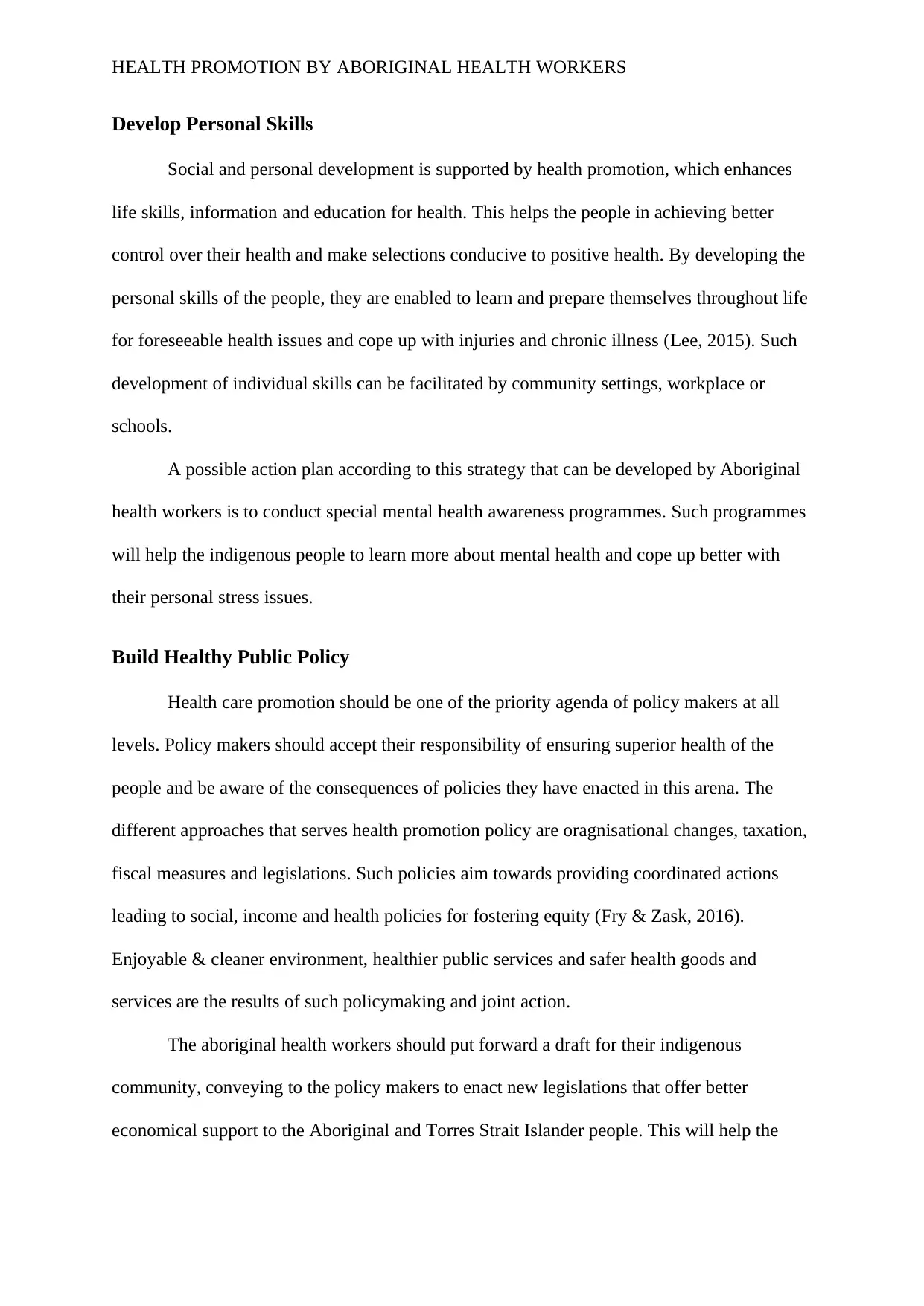
HEALTH PROMOTION BY ABORIGINAL HEALTH WORKERS
Develop Personal Skills
Social and personal development is supported by health promotion, which enhances
life skills, information and education for health. This helps the people in achieving better
control over their health and make selections conducive to positive health. By developing the
personal skills of the people, they are enabled to learn and prepare themselves throughout life
for foreseeable health issues and cope up with injuries and chronic illness (Lee, 2015). Such
development of individual skills can be facilitated by community settings, workplace or
schools.
A possible action plan according to this strategy that can be developed by Aboriginal
health workers is to conduct special mental health awareness programmes. Such programmes
will help the indigenous people to learn more about mental health and cope up better with
their personal stress issues.
Build Healthy Public Policy
Health care promotion should be one of the priority agenda of policy makers at all
levels. Policy makers should accept their responsibility of ensuring superior health of the
people and be aware of the consequences of policies they have enacted in this arena. The
different approaches that serves health promotion policy are oragnisational changes, taxation,
fiscal measures and legislations. Such policies aim towards providing coordinated actions
leading to social, income and health policies for fostering equity (Fry & Zask, 2016).
Enjoyable & cleaner environment, healthier public services and safer health goods and
services are the results of such policymaking and joint action.
The aboriginal health workers should put forward a draft for their indigenous
community, conveying to the policy makers to enact new legislations that offer better
economical support to the Aboriginal and Torres Strait Islander people. This will help the
Develop Personal Skills
Social and personal development is supported by health promotion, which enhances
life skills, information and education for health. This helps the people in achieving better
control over their health and make selections conducive to positive health. By developing the
personal skills of the people, they are enabled to learn and prepare themselves throughout life
for foreseeable health issues and cope up with injuries and chronic illness (Lee, 2015). Such
development of individual skills can be facilitated by community settings, workplace or
schools.
A possible action plan according to this strategy that can be developed by Aboriginal
health workers is to conduct special mental health awareness programmes. Such programmes
will help the indigenous people to learn more about mental health and cope up better with
their personal stress issues.
Build Healthy Public Policy
Health care promotion should be one of the priority agenda of policy makers at all
levels. Policy makers should accept their responsibility of ensuring superior health of the
people and be aware of the consequences of policies they have enacted in this arena. The
different approaches that serves health promotion policy are oragnisational changes, taxation,
fiscal measures and legislations. Such policies aim towards providing coordinated actions
leading to social, income and health policies for fostering equity (Fry & Zask, 2016).
Enjoyable & cleaner environment, healthier public services and safer health goods and
services are the results of such policymaking and joint action.
The aboriginal health workers should put forward a draft for their indigenous
community, conveying to the policy makers to enact new legislations that offer better
economical support to the Aboriginal and Torres Strait Islander people. This will help the
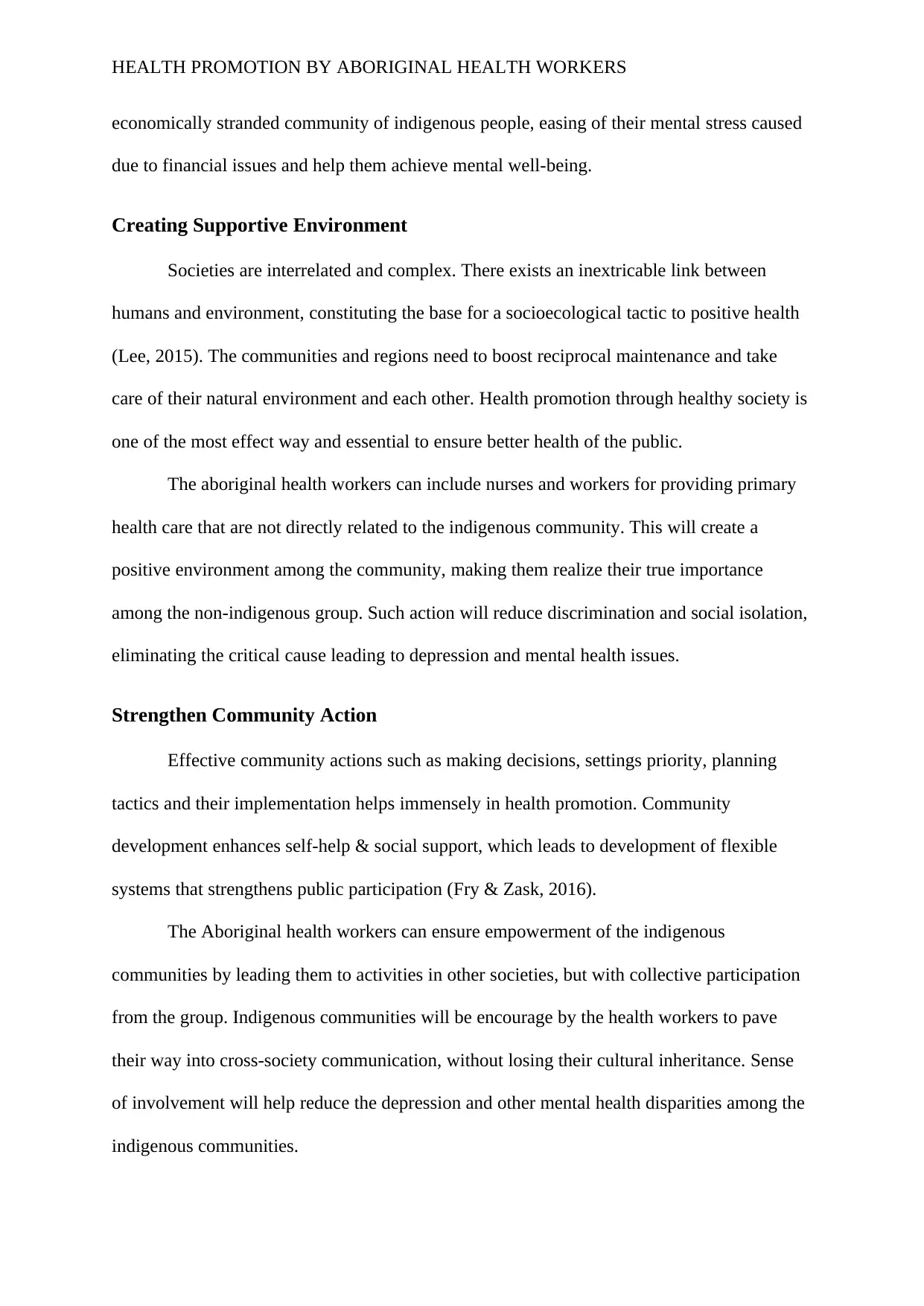
HEALTH PROMOTION BY ABORIGINAL HEALTH WORKERS
economically stranded community of indigenous people, easing of their mental stress caused
due to financial issues and help them achieve mental well-being.
Creating Supportive Environment
Societies are interrelated and complex. There exists an inextricable link between
humans and environment, constituting the base for a socioecological tactic to positive health
(Lee, 2015). The communities and regions need to boost reciprocal maintenance and take
care of their natural environment and each other. Health promotion through healthy society is
one of the most effect way and essential to ensure better health of the public.
The aboriginal health workers can include nurses and workers for providing primary
health care that are not directly related to the indigenous community. This will create a
positive environment among the community, making them realize their true importance
among the non-indigenous group. Such action will reduce discrimination and social isolation,
eliminating the critical cause leading to depression and mental health issues.
Strengthen Community Action
Effective community actions such as making decisions, settings priority, planning
tactics and their implementation helps immensely in health promotion. Community
development enhances self-help & social support, which leads to development of flexible
systems that strengthens public participation (Fry & Zask, 2016).
The Aboriginal health workers can ensure empowerment of the indigenous
communities by leading them to activities in other societies, but with collective participation
from the group. Indigenous communities will be encourage by the health workers to pave
their way into cross-society communication, without losing their cultural inheritance. Sense
of involvement will help reduce the depression and other mental health disparities among the
indigenous communities.
economically stranded community of indigenous people, easing of their mental stress caused
due to financial issues and help them achieve mental well-being.
Creating Supportive Environment
Societies are interrelated and complex. There exists an inextricable link between
humans and environment, constituting the base for a socioecological tactic to positive health
(Lee, 2015). The communities and regions need to boost reciprocal maintenance and take
care of their natural environment and each other. Health promotion through healthy society is
one of the most effect way and essential to ensure better health of the public.
The aboriginal health workers can include nurses and workers for providing primary
health care that are not directly related to the indigenous community. This will create a
positive environment among the community, making them realize their true importance
among the non-indigenous group. Such action will reduce discrimination and social isolation,
eliminating the critical cause leading to depression and mental health issues.
Strengthen Community Action
Effective community actions such as making decisions, settings priority, planning
tactics and their implementation helps immensely in health promotion. Community
development enhances self-help & social support, which leads to development of flexible
systems that strengthens public participation (Fry & Zask, 2016).
The Aboriginal health workers can ensure empowerment of the indigenous
communities by leading them to activities in other societies, but with collective participation
from the group. Indigenous communities will be encourage by the health workers to pave
their way into cross-society communication, without losing their cultural inheritance. Sense
of involvement will help reduce the depression and other mental health disparities among the
indigenous communities.
⊘ This is a preview!⊘
Do you want full access?
Subscribe today to unlock all pages.

Trusted by 1+ million students worldwide
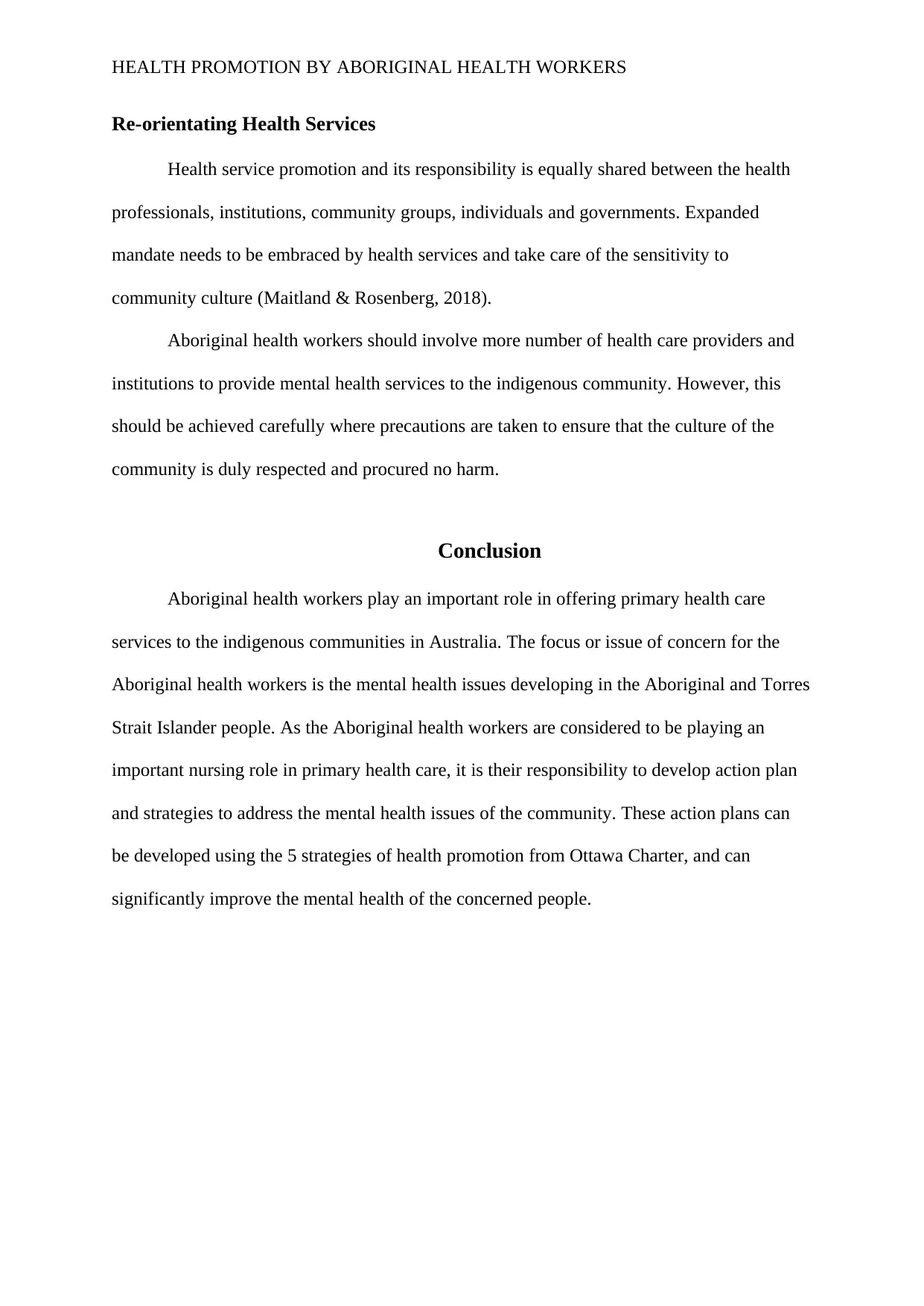
HEALTH PROMOTION BY ABORIGINAL HEALTH WORKERS
Re-orientating Health Services
Health service promotion and its responsibility is equally shared between the health
professionals, institutions, community groups, individuals and governments. Expanded
mandate needs to be embraced by health services and take care of the sensitivity to
community culture (Maitland & Rosenberg, 2018).
Aboriginal health workers should involve more number of health care providers and
institutions to provide mental health services to the indigenous community. However, this
should be achieved carefully where precautions are taken to ensure that the culture of the
community is duly respected and procured no harm.
Conclusion
Aboriginal health workers play an important role in offering primary health care
services to the indigenous communities in Australia. The focus or issue of concern for the
Aboriginal health workers is the mental health issues developing in the Aboriginal and Torres
Strait Islander people. As the Aboriginal health workers are considered to be playing an
important nursing role in primary health care, it is their responsibility to develop action plan
and strategies to address the mental health issues of the community. These action plans can
be developed using the 5 strategies of health promotion from Ottawa Charter, and can
significantly improve the mental health of the concerned people.
Re-orientating Health Services
Health service promotion and its responsibility is equally shared between the health
professionals, institutions, community groups, individuals and governments. Expanded
mandate needs to be embraced by health services and take care of the sensitivity to
community culture (Maitland & Rosenberg, 2018).
Aboriginal health workers should involve more number of health care providers and
institutions to provide mental health services to the indigenous community. However, this
should be achieved carefully where precautions are taken to ensure that the culture of the
community is duly respected and procured no harm.
Conclusion
Aboriginal health workers play an important role in offering primary health care
services to the indigenous communities in Australia. The focus or issue of concern for the
Aboriginal health workers is the mental health issues developing in the Aboriginal and Torres
Strait Islander people. As the Aboriginal health workers are considered to be playing an
important nursing role in primary health care, it is their responsibility to develop action plan
and strategies to address the mental health issues of the community. These action plans can
be developed using the 5 strategies of health promotion from Ottawa Charter, and can
significantly improve the mental health of the concerned people.
Paraphrase This Document
Need a fresh take? Get an instant paraphrase of this document with our AI Paraphraser
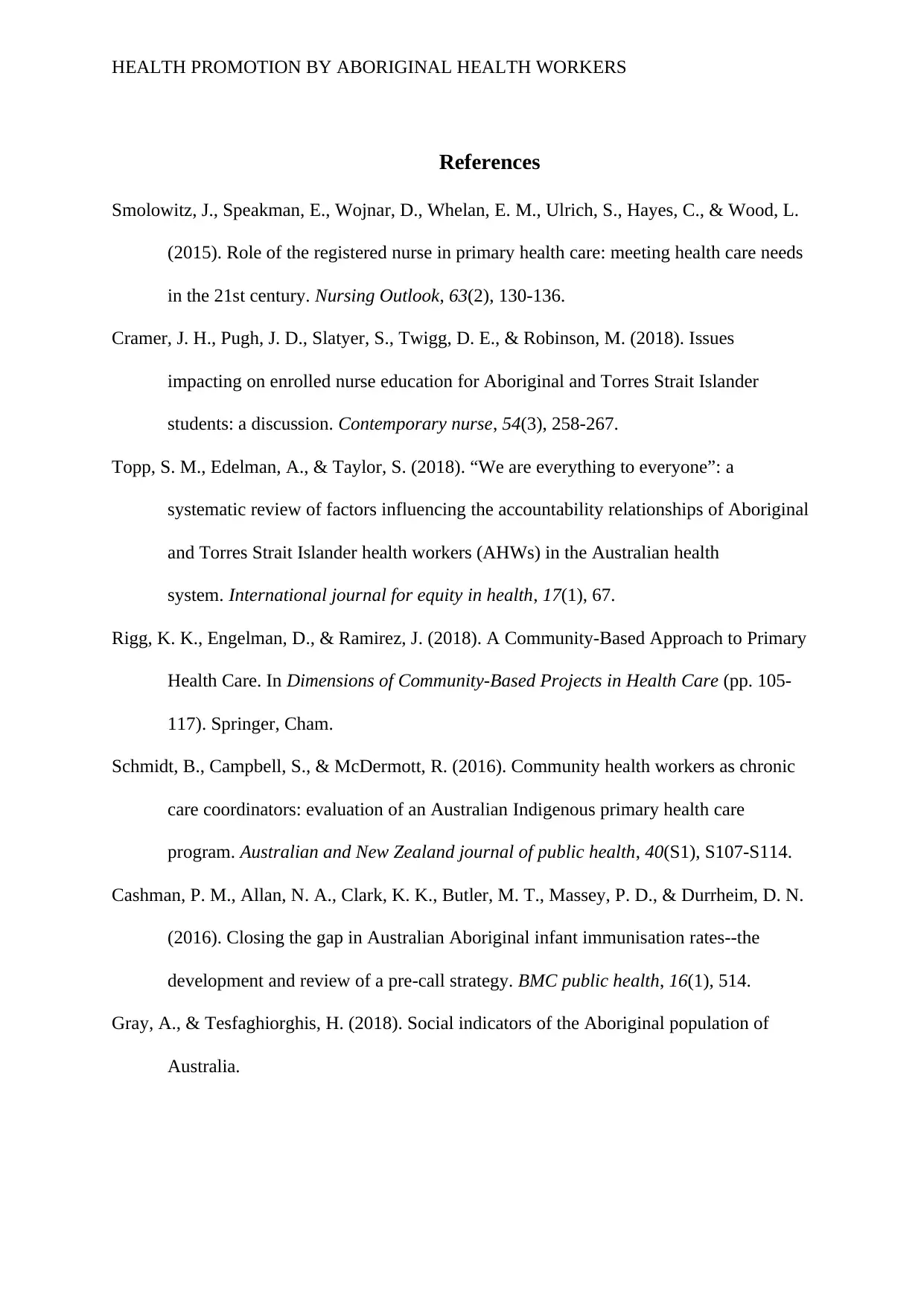
HEALTH PROMOTION BY ABORIGINAL HEALTH WORKERS
References
Smolowitz, J., Speakman, E., Wojnar, D., Whelan, E. M., Ulrich, S., Hayes, C., & Wood, L.
(2015). Role of the registered nurse in primary health care: meeting health care needs
in the 21st century. Nursing Outlook, 63(2), 130-136.
Cramer, J. H., Pugh, J. D., Slatyer, S., Twigg, D. E., & Robinson, M. (2018). Issues
impacting on enrolled nurse education for Aboriginal and Torres Strait Islander
students: a discussion. Contemporary nurse, 54(3), 258-267.
Topp, S. M., Edelman, A., & Taylor, S. (2018). “We are everything to everyone”: a
systematic review of factors influencing the accountability relationships of Aboriginal
and Torres Strait Islander health workers (AHWs) in the Australian health
system. International journal for equity in health, 17(1), 67.
Rigg, K. K., Engelman, D., & Ramirez, J. (2018). A Community-Based Approach to Primary
Health Care. In Dimensions of Community-Based Projects in Health Care (pp. 105-
117). Springer, Cham.
Schmidt, B., Campbell, S., & McDermott, R. (2016). Community health workers as chronic
care coordinators: evaluation of an Australian Indigenous primary health care
program. Australian and New Zealand journal of public health, 40(S1), S107-S114.
Cashman, P. M., Allan, N. A., Clark, K. K., Butler, M. T., Massey, P. D., & Durrheim, D. N.
(2016). Closing the gap in Australian Aboriginal infant immunisation rates--the
development and review of a pre-call strategy. BMC public health, 16(1), 514.
Gray, A., & Tesfaghiorghis, H. (2018). Social indicators of the Aboriginal population of
Australia.
References
Smolowitz, J., Speakman, E., Wojnar, D., Whelan, E. M., Ulrich, S., Hayes, C., & Wood, L.
(2015). Role of the registered nurse in primary health care: meeting health care needs
in the 21st century. Nursing Outlook, 63(2), 130-136.
Cramer, J. H., Pugh, J. D., Slatyer, S., Twigg, D. E., & Robinson, M. (2018). Issues
impacting on enrolled nurse education for Aboriginal and Torres Strait Islander
students: a discussion. Contemporary nurse, 54(3), 258-267.
Topp, S. M., Edelman, A., & Taylor, S. (2018). “We are everything to everyone”: a
systematic review of factors influencing the accountability relationships of Aboriginal
and Torres Strait Islander health workers (AHWs) in the Australian health
system. International journal for equity in health, 17(1), 67.
Rigg, K. K., Engelman, D., & Ramirez, J. (2018). A Community-Based Approach to Primary
Health Care. In Dimensions of Community-Based Projects in Health Care (pp. 105-
117). Springer, Cham.
Schmidt, B., Campbell, S., & McDermott, R. (2016). Community health workers as chronic
care coordinators: evaluation of an Australian Indigenous primary health care
program. Australian and New Zealand journal of public health, 40(S1), S107-S114.
Cashman, P. M., Allan, N. A., Clark, K. K., Butler, M. T., Massey, P. D., & Durrheim, D. N.
(2016). Closing the gap in Australian Aboriginal infant immunisation rates--the
development and review of a pre-call strategy. BMC public health, 16(1), 514.
Gray, A., & Tesfaghiorghis, H. (2018). Social indicators of the Aboriginal population of
Australia.
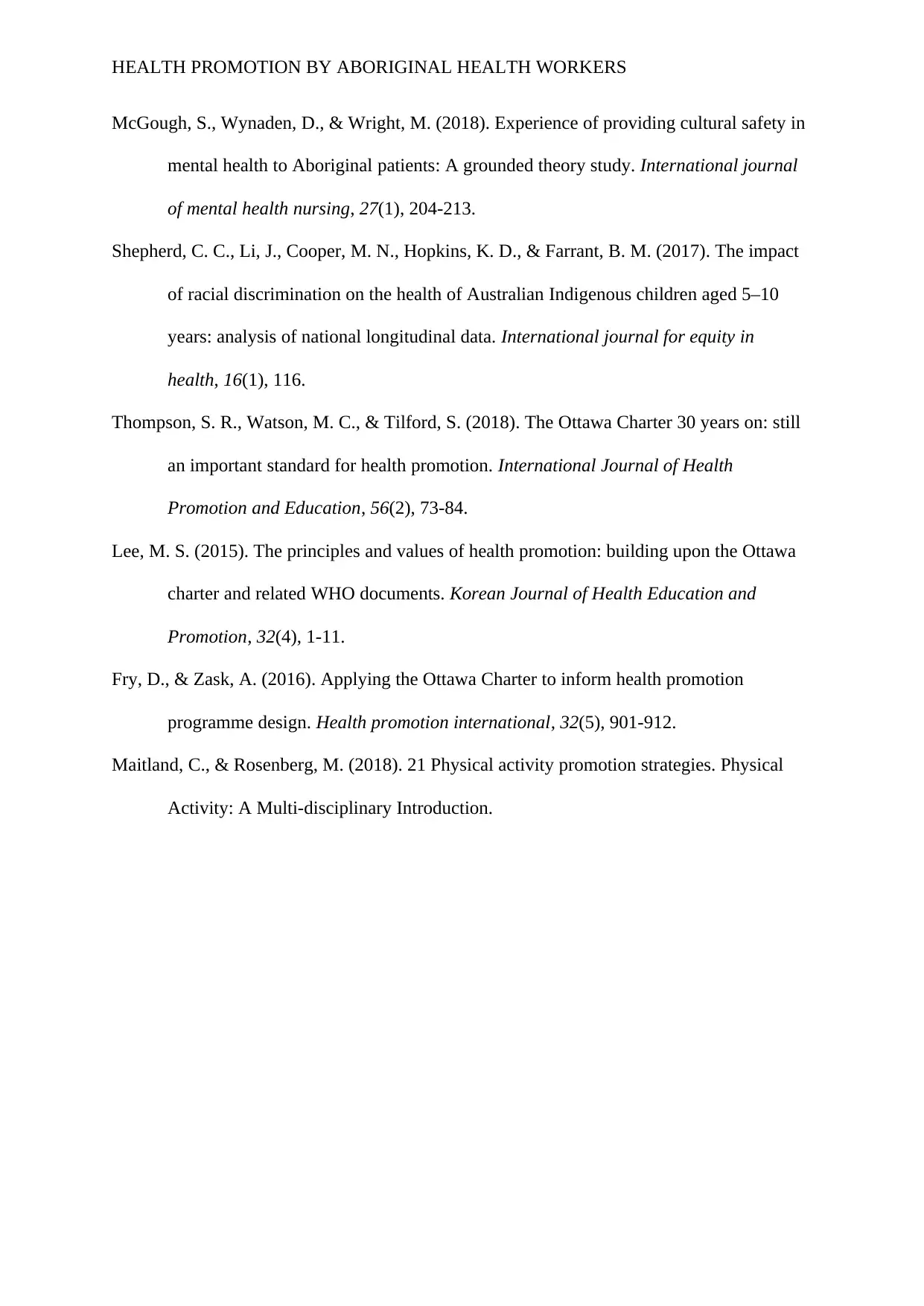
HEALTH PROMOTION BY ABORIGINAL HEALTH WORKERS
McGough, S., Wynaden, D., & Wright, M. (2018). Experience of providing cultural safety in
mental health to Aboriginal patients: A grounded theory study. International journal
of mental health nursing, 27(1), 204-213.
Shepherd, C. C., Li, J., Cooper, M. N., Hopkins, K. D., & Farrant, B. M. (2017). The impact
of racial discrimination on the health of Australian Indigenous children aged 5–10
years: analysis of national longitudinal data. International journal for equity in
health, 16(1), 116.
Thompson, S. R., Watson, M. C., & Tilford, S. (2018). The Ottawa Charter 30 years on: still
an important standard for health promotion. International Journal of Health
Promotion and Education, 56(2), 73-84.
Lee, M. S. (2015). The principles and values of health promotion: building upon the Ottawa
charter and related WHO documents. Korean Journal of Health Education and
Promotion, 32(4), 1-11.
Fry, D., & Zask, A. (2016). Applying the Ottawa Charter to inform health promotion
programme design. Health promotion international, 32(5), 901-912.
Maitland, C., & Rosenberg, M. (2018). 21 Physical activity promotion strategies. Physical
Activity: A Multi-disciplinary Introduction.
McGough, S., Wynaden, D., & Wright, M. (2018). Experience of providing cultural safety in
mental health to Aboriginal patients: A grounded theory study. International journal
of mental health nursing, 27(1), 204-213.
Shepherd, C. C., Li, J., Cooper, M. N., Hopkins, K. D., & Farrant, B. M. (2017). The impact
of racial discrimination on the health of Australian Indigenous children aged 5–10
years: analysis of national longitudinal data. International journal for equity in
health, 16(1), 116.
Thompson, S. R., Watson, M. C., & Tilford, S. (2018). The Ottawa Charter 30 years on: still
an important standard for health promotion. International Journal of Health
Promotion and Education, 56(2), 73-84.
Lee, M. S. (2015). The principles and values of health promotion: building upon the Ottawa
charter and related WHO documents. Korean Journal of Health Education and
Promotion, 32(4), 1-11.
Fry, D., & Zask, A. (2016). Applying the Ottawa Charter to inform health promotion
programme design. Health promotion international, 32(5), 901-912.
Maitland, C., & Rosenberg, M. (2018). 21 Physical activity promotion strategies. Physical
Activity: A Multi-disciplinary Introduction.
⊘ This is a preview!⊘
Do you want full access?
Subscribe today to unlock all pages.

Trusted by 1+ million students worldwide
1 out of 9
Related Documents
Your All-in-One AI-Powered Toolkit for Academic Success.
+13062052269
info@desklib.com
Available 24*7 on WhatsApp / Email
![[object Object]](/_next/static/media/star-bottom.7253800d.svg)
Unlock your academic potential
Copyright © 2020–2026 A2Z Services. All Rights Reserved. Developed and managed by ZUCOL.





